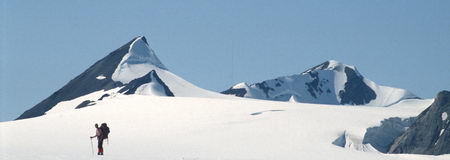Your words and images should build bridges to make it easy for the audience to enter and understand the world you are introducing them to. You may well be an expert in your field, but that alone does not guarantee a good talk. Here are my top speaking tips.
Start your talk with some 'oomph'
After you've been
introduced and the audience go silent, they're all thinking "what is this speaker going to be like?", "will they be any good?", "is this going to be an
interesting talk?". They are waiting to judge you. What do I do? I inject some energy into the room. I start my talk immediately: no bumbling,
fumbling, hesitation, or apologies. I might run a quick sequence
of great slides to give a rapid overview of the talk. I might start with an arresting statement to catch
the audience's curiousity. I might start with an attention grabbing animation. However I do it I want them to know within the first few seconds that they're going to have an enjoyable, worthwhile time with
a speaker who knows what they're doing.
The most nervous person in the room won't be you, it will be the person who booked you. I love watching the booker relax in their seat a few seconds
into my talk as they realise "hey, I haven't messed up here: this is going to be good."
Be heard
A really important point. If people are straining to hear you they will switch off and it doesn't matter how good the talk itself is. Don't turn to look at your slides while talking: you should be looking at the audience to avoid drops in volume (and also to make them feel you're engaging with them and including them in your talk). If using a hand held microphone, hold it against your chin: this usually gives the correct volume level and also means that as you turn your head, the mike stays with you, again avoiding drop outs.
Have a clear aim
It's good to have a clear aim. "Surviving a volcanic eruption", "Why the Grand Canyon is so special", "How do we value nature?", are all clear aims that will guide you in designing the talk and help ensure you stay focused.
Be likeable
Audiences warm to a speaker who seems nice. They are more prepared to go along with you for the journey you are proposing to take them on, and it makes for a splendid social lubricant. Smile and make it clear you're glad to be there.
Use visual aids to support your talk (as appropriate)
Whatever the audience is looking at should help them engage with your words. We are visual animals and well chosen illustrations or artefacts can make life much easier for the audience. I've used ropes, inflatable boats, and climbing equipment to bring a talk alive and help the audience relate to what I'm talking about.
Keep text on slides to a minimum (and don't read it out if you have)
If you must use text in a slide, don't treat it like a script and read it out: the audience will have read it much faster than you can speak it and will now be bored and distracted waiting for you to finish. Your voice should 'add value' to any text on the screen, not repeat it. Slides should illustrate what you’re saying, not be a transcript of it.
Put the graft in before the talk
I put a lot of time and effort into creating my talks: working out what I want to say, researching up to date facts, selecting good sounds and images, thinking about the best screen ratio, creating visually appealing slides, making sure I've timed my talk to the length of slot I've been given.... The professional look of my presentations sends a message to the audience that I respect them, that I think they were worth making the effort for. I have attended some talks where minimal effort has been expended on the presentation, and unconsciously they're telling the audience that the speaker's time is more important than theirs. See the example below...
PowerPoint slides are cheap: don't skimp on them
I was once booked by a company who'd hired a TV celebrity and author the month before. The celebrity droned on, reading from a script for 90 minutes (therefore making no eye contact with the audience, who then started feeling irrelevant and so became disengaged), and used only two slides. The audience was unimpressed and the company swore never to book them again. Slides should support or illustrate the point you are making: this helps the audience follow you. Don't keep the same slide up long after it's ceased to relate to what you are now talking about. Many slides are fine IF they have no words and IF you have a great story to weave around them.
Don't baffle with big numbers
It's hard for anyone to relate to big numbers: they're almost meaningless. At its peak in AD79, Vesuvius was erupting 1.5 million tons
of ash per second. I can't envisage that, can you? What if I said it was the equivalent of 300,000 African elephants? Everyone can imagine an elephant
and the thought of 300,000 of those dropping out of the sky a second makes it understandable why roofs were collapsing and people were struggling to wade
through ash on the streets in almost total darkness.
I could tell you the volume of the world's oceans is x million cubic kilometres. Or I could say they would fill a vase 1,000km in diameter and 1,000km
deep (and there's still more water than that trapped in the rocks of the Earth!).
Show, don't tell
Don't waste time and words explaining where a place is: show a map. Don't explain what something looks like: show a picture of it.
In my
energy talk I use a simple, clear graph that shows the relationship between how much energy a country uses and its literacy rate, infant mortality,
and life expectancy. If I didn't use that graph I would have to spend several minutes using words to try and describe those relationships and hope the
audience could follow me. Instead,
I put up that slide and instantly the audience grasps the point I'm making without me having to explain anything.
Go big
It doesn't matter how good the slide looks to you at your desk, always look at it from the audience's perspective. Think about the people toward the back of the room, or those with poorer vision. Too many images on your slide? Give them a slide each, where they can be displayed at a good size for an audience. Extra slides in your presentation cost you no more than one slide: they're not rationed. Make it big so people aren't squinting or, worse, giving up trying to comprehend it.
You are a story teller
Occasionally I've attended a travel talk where the images have been fantastic but there has been nothing connecting them. If you're giving a talk you are a storyteller, and so the images should serve the talk. I have some great images that will never appear in any of my talks, because they don't illustrate what I wish to talk about.
'The world belongs to the enthusiast who keeps cool'
Wise words from William McFee. Enthusiasm is good, but only takes you so far. An enthusiastic speaker, who also presents a well planned, well illustrated talk, will always be appreciated. Your talk should be an enjoyable audience experience, no matter how factual the subject. With so many demands on their time, you should leave them feeling glad that they chose to spend time listening to you.
 guest speaker / guide / geologist / university tutor
guest speaker / guide / geologist / university tutor





